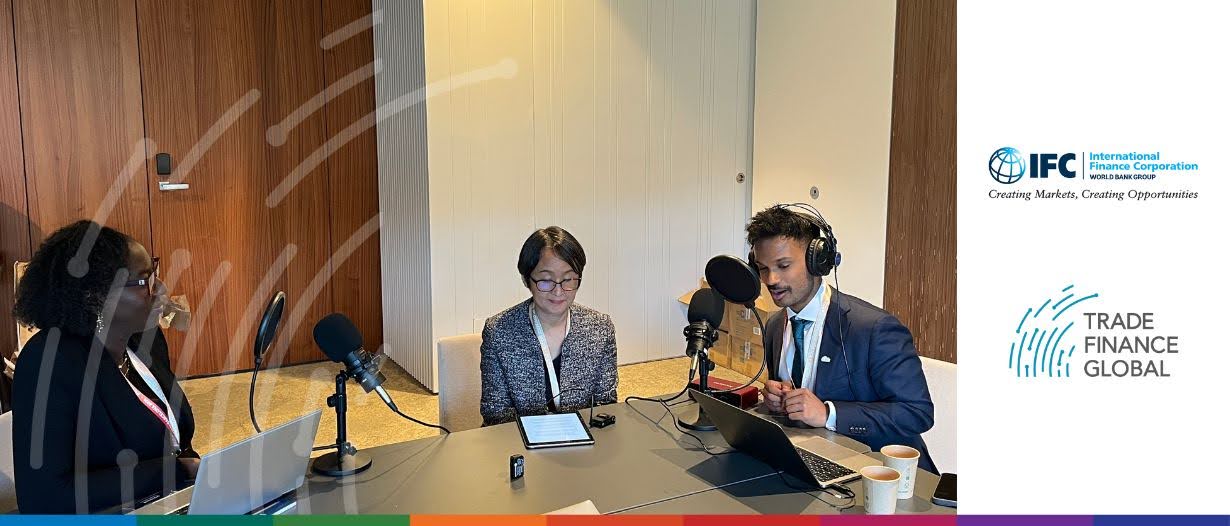Estimated reading time: 5 minutes
Listen to this podcast on Spotify, Apple Podcasts, Podbean, Podtail, ListenNotes, TuneIn
Only 15% of exporting firms are led by women.
This finding, from the IFC’s whitepaper “Banking on Women Who Trade Across Borders”, speaks to the gender disparity that still exists in the international trade space, particularly in emerging markets.
To learn more about the challenges that women entrepreneurs face when trading across borders and some of the initiatives in place to offer support, Trade Finance Global (TFG) spoke with Makiko Toyoda, Global Head of the Global Trade Finance and Global Supply Chain Finance Programs at the International Finance Corporation (IFC), and Tacko Baro Fall, Waemu Head Financial Institutions And International Organizations at Ecobank.
The challenges facing women in trade are daunting
Women in trade face significant challenges that hinder their ability to participate fully and equally in the global market.
Toyoda said, “In emerging markets, many women face difficult collateral requirements, they often don’t have a credit history, and there is a high cost of trade finance transactions”
These high costs associated with trade finance transactions can be disproportionately burdensome for women-led firms, which might already be operating with thinner margins compared to their male counterparts.
Furthermore, the complexity of trade finance products themselves poses a substantial obstacle, particularly for those who are not well-versed in navigating the financial landscape, which disproportionately includes women due to historical and systemic educational and professional gaps in finance.
These challenges collectively contribute to a discouraging environment for women entrepreneurs in trade, limiting their growth opportunities and reducing their competitive edge in the global marketplace.
Recognising these challenges, organisations like the IFC and Ecobank are working to put initiatives and programmes in place to help change the status quo.
Baro Fall said, “It is imperative that we support women. We simply cannot ignore them as they constitute a significant number of our population and integral to the entrepreneurial landscape.”
Changing the status quo for gender equality in trade
Several initiatives and programs are actively addressing the challenges faced by women in trade, spearheaded by institutions like the IFC and Ecobank.
The IFC has launched efforts through its Global Trade Finance Program (GTFP), which has been instrumental in supporting financial institutions in emerging markets to facilitate access to global markets.
A notable part of this initiative is the collaboration with the Goldman Sachs Foundation to provide price discounts for women importers and exporters, aiming to increase the financial participation of women in trade.
Despite these efforts, however, the volume of transactions involving women remains disappointingly low.
Toyoda said, “Since 2019, we have only booked $260 million in transactions for women-led businesses. While that is not a small number, over the same period we booked a total of $40 billion in trade finance transactions, which means that only 0.65% of the total value went to women. This is not acceptable.”
To help overcome this disparity, the GTFP has been partnering with financial institutions to provide training programs on the importance of gender awareness with the ultimate aim of helping provide incentives for banks to book more women-related transactions.
Some banks, like Ecobank, have embraced this mindset and launched programs to that end – a positive sign that change is coming.
For example, Ellevate, a gender financing program launched by Ecobank, is designed to provide both financial and non-financial support to female business owners, ensuring a holistic approach to supporting women entrepreneurs.
Baro Fall said, “We recognise three basic needs: the access to credit, the access to markets, and the capabilities development.”
The programme leverages key partnerships with non-profit organisations, government agencies, and development institutions to enhance its offerings and reduce the need for traditional collateral requirements, making finance more accessible to women entrepreneurs.
Together, these initiatives represent a robust effort to integrate women more fully into the global trade environment by reducing financial barriers and increasing their business capacities through strategic support and training programs.
With gaining momentum, it is time to begin putting together innovative solutions for the years ahead.
Levelling the gender playing field in the years to come
The future innovations in improving access to finance for women in trade involve a blend of digital solutions and strategic partnerships, one of which is the increased adoption of digital platforms and tools that enhance financial inclusion.
Baro Fall said, “At Ecobank, we have launched a Trade Hub platform to help our women clients access markets in around 33 countries, where they will be able to sell and buy their goods and services.”
This platform is part of a broader movement towards digitalisation that was accelerated by the COVID-19 pandemic, leading to greater adoption of digital financial services. Such digital solutions are especially beneficial for women, who are more likely to engage in online transactions and can benefit from mobile money payment services that facilitate easier and more accessible trade transactions.
Another approach on the horizon is the use of blended finance, which combines concessional funds from donors or development finance institutions with commercial capital, aiming to motivate stakeholders to commit to gender-inclusive development goals.
The idea is to use blended finance as a tool to encourage banks and other financial institutions to alter their traditional financing models, which often exclude women due to stringent collateral and credit history requirements.
Furthermore, there’s a push for multilateral development banks (MDBs) to play a more coordinated role in promoting access to trade finance for women.
Toyoda said, “We don’t have a task force for gender trade, which is pretty embarrassing. In the future, this is something that we can propose to have under MDB’s working groups so that we can think about collective actions.”
Such a task force would potentially advocate for regulatory changes to support women-owned businesses, amplifying the impact of financial and developmental initiatives.
These future directions signify a holistic approach to addressing the systemic barriers that women face in trade, emphasising the role of technology, innovative financing structures, and collaborative efforts among global financial institutions and development agencies.




























